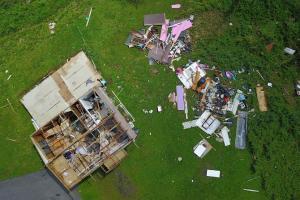The study tracked excess deaths related to Hurricane Maria from September 2017 to February 2018, and found the toll was "22 per cent higher than the number of deaths that would have been expected during that period in a year without the storm"

In this file photo taken on September 24, 2017 a house destroyed by hurricane winds is seen in Barranquitas, southwest of San Juan, Puerto Rico, following the passage of Hurricane Maria. Hurricane Maria killed 2,975 people in Puerto Rico. Pic/AFP
Hurricane Maria killed 2,975 people in Puerto Rico, according to the results of a long-awaited study commissioned by the US government, amid controversy over the true toll of the 2017 monster storm. "The results of our epidemiological study suggest that, tragically, Hurricane Maria led to a large number of excess deaths throughout the island," said principal investigator Carlos Santos-Burgoa, a professor of global health at George Washington University.
"Certain groups -- those in lower income areas and the elderly -- faced the highest risk." The study tracked excess deaths related to Hurricane Maria from September 2017 to February 2018, and found the toll was "22 per cent higher than the number of deaths that would have been expected during that period in a year without the storm".
ADVERTISEMENT
The government's long-standing official death toll from Maria has been just 64 for the island territory which is part of the United States. A study by Harvard University earlier this year estimated around 4,600 had died in the three months following the storm. Authors of the latest report described it as "the most rigorous study of excess mortality due to the hurricane done to date."
The report is based on an analysis of death certificates and other mortality data for six months from September 2017 through February 2018. Researchers estimated the excess deaths with the help of mathematical modeling that compared post-hurricane deaths to the expected number based on historical patterns, and adjusted for age, sex and migration from the island.
The team also identified flaws in the system that may have led to an under-reporting of deaths previously, including lack of communication, and poor training for doctors on how to certify deaths in disasters. Hurricane Maria pummeled Puerto Rico in September 2017, wreaking widespread devastation and causing USD 90 billion in damages. It is ranked as the third costliest cyclone in the United States since 1900. For comparison, the death toll from 2005's Hurricane Katrina -- the costliest hurricane in US history -- was far lower, and estimated at 1,833.
The previous findings by Harvard University blamed most deaths after Hurricane Maria on interruptions in medical care due to power outages and blocked or washed out roads. Households went for an average of 84 days without electricity, 64 days without water, and 41 days without cellular telephone coverage after the storm. The government of Puerto Rico stopped publicly sharing its data on hurricane deaths in December 2017.
Catch up on all the latest Crime, National, International and Hatke news here. Also download the new mid-day Android and iOS apps to get latest updates
This story has been sourced from a third party syndicated feed, agencies. Mid-day accepts no responsibility or liability for its dependability, trustworthiness, reliability and data of the text. Mid-day management/mid-day.com reserves the sole right to alter, delete or remove (without notice) the content in its absolute discretion for any reason whatsoever
 Subscribe today by clicking the link and stay updated with the latest news!" Click here!
Subscribe today by clicking the link and stay updated with the latest news!" Click here!







